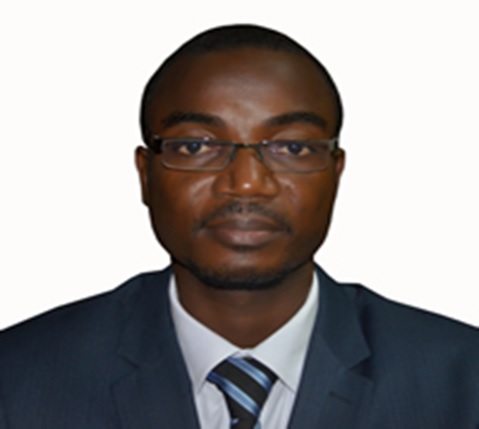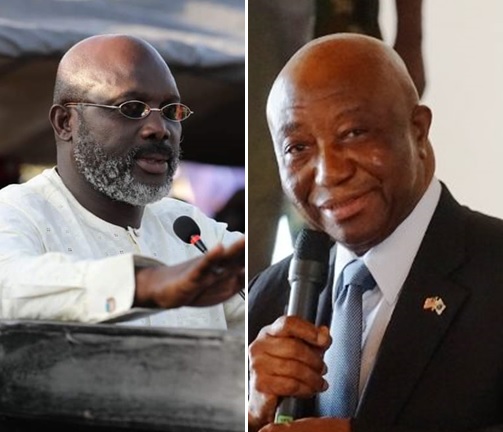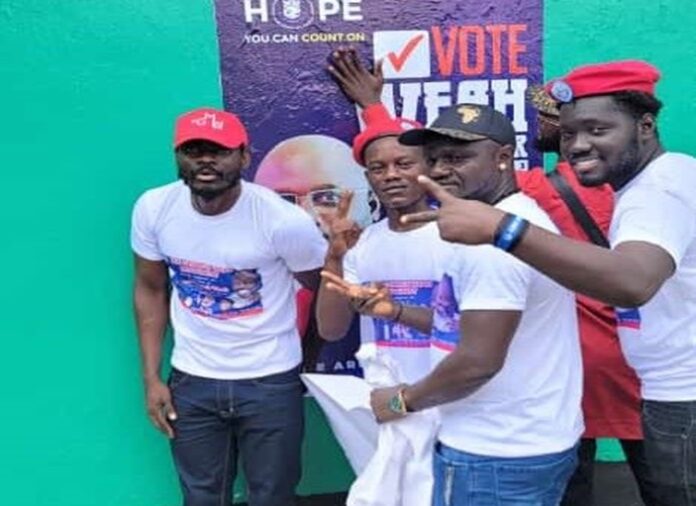MONROVIA – Former Finance Minister Boima Kamara has expressed his concerns regarding the Liberian government’s approach under President George Weah, stating that their actions discourage both investors and investment in the country.
Mr. Kamara, currently serving as a Health Financing Advisor to the Africa Centers for Disease Control and Prevention Health Economics Program, highlighted in an exclusive interview with Concord Times that several business leaders have reported difficulties in even scheduling meetings with government representatives. Below see the full exclusive interview conducted with former Finance and Development Planning Minister, Mr. Boaima Kamara by Concord Times’ editor, Lyndon J. Ponnie on November 3, 2023
Lyndon Ponnie: Welcome Mr. Boima Kamara and thank you for agreeing to this interview.
Lyndon Ponnie: As a former Minister of Finance and Development Planning, how would you compare the current state of Liberia’s economy to that during your tenure?
Boima Kamara: Response: In regards to the current state of the Liberian economy, I believe that entrenched corruption under the Weah-Led Administration continues to hinder economic progress. On August 15, 2022, the Treasury Department sanctioned the Minister of State for Presidential Affairs, Nathaniel McGill, the Solicitor General and Chief Prosecutor of Liberia, Sayma Syrenius Cephus, and the Managing Director of the National Port Authority, Bill Twehway, for ongoing public corruption, which subsequently led to their resignations. These sanctions have garnered strong support from the Liberian people, who are calling for more actions to hold public officials accountable. I am of the view that the Liberia Anti-Corruption Commission (LACC) lacks the political support of the government and rarely pursues public corruption cases seriously.
On the topic of the economy, the US State Department’s 2023 Investment Climate Report states the following: “The World Bank’s latest report shows that Liberia’s GDP per capita was USD 676 in 2021, compared to USD 700 before the outbreak of the pandemic in 2019. There is a high public perception of corruption in the public sector, as indicated by Liberia’s poor ranking in Transparency International’s 2022 Corruption Perceptions Index, where Liberia dropped six places to 142 out of 180 countries. Low public trust in the banking sector and limited access to business financing result in most cash being held outside of banks. Other factors, such as low human development indicators, expensive and unreliable electricity, poor infrastructure, limited internet access (especially in rural areas), and pervasive government corruption, further constrain investment and development.
In practice, the Liberian government engages in actions that discourage investors and investment in the country. Some business leaders report that it is difficult to even schedule meetings with government representatives to discuss new investment or policies that would negatively impact the business climate unless bribes are offered. A weak legal and regulatory framework, lack of transparency in contract awards, and widespread corruption hinder foreign direct investment. Instead of viewing foreign investors as partners in creating long-term growth for the country, government officials often see them as opportunities for short-term gains through graft. The government’s decisions concerning the business sector are driven more by political cronyism rather than considering the investment climate. Many businesses find it easier to operate illegally if they pay the right political interests, while those who attempt to follow the rules receive little to no assistance from government agencies and may become targets for officials seeking bribes or unofficial payments.
In terms of transparency, companies are required to adhere to International Financial Reporting Standards (IFRS). However, authorities do not consistently enforce or apply national laws and international standards. There are no systematic oversight or enforcement mechanisms in place to ensure that government authorities adhere to administrative rules. Accounting, legal, and regulatory procedures lack transparency. Although Liberia passed a Freedom of Information Law in 2010, which requires government agencies to appoint a public information officer and make records accessible to the public, access to government records is often challenging or impossible. Government finances, including revenues and debt obligations, are only partially reflected in national budgets and lack full transparency. Some budget documents are available online.
Considering these macroeconomic indicators: 1) Total Public Debt – During the twelve-year tenure of the Sirleaf Administration, the debt stock declined from US$4,524.9 million in 2006 to US$878.17 million, representing a reduction of US$3.65 billion. This reduction was primarily driven by a decrease in external debt from US$4,254.6 million to US$612.03 million and domestic debt from US$882.1 million to US$266.14 million. It is important to note that the domestic debt primarily consisted of legacy debt on the Central Bank of Liberia’s books dating back to the 1980s. However, under President Weah’s six-year leadership, Liberia’s total public debt increased by over US$1.33 billion, largely due to significant borrowing from the Central Bank of Liberia, commercial banks, and NASSCORP. 2) The value of the Liberian dollar deteriorated to an average exchange rate of L$183.94/US$ during President Weah’s six-year period, compared to an average exchange rate of L$77.97/US$ throughout the twelve-year reign of Madam Sirleaf when Joseph N. Boakai served as Vice President. 3) Inflation worsened to an average rate of 15.59% during President Weah’s six years in office, compared to an average inflation rate of 9.43% under former President Sirleaf.
Lyndon Ponnie: I understand that you officially handed over to Minister Samuel D. Tweah, and during the ceremony, you presented turnover notes. Could you provide some insight into the contents of the turnover note?
Kamara: For the record, there was no official turnover ceremony between myself as the outgoing Minister and Tweah as the incoming Minister. However, I did leave a comprehensive report on the minister’s desk, which included the balances in the Government of Liberia consolidated accounts at the Central Bank of Liberia, both in US dollars and Liberian dollars. Additionally, I included two audit reports on the debt management system (DMS) and the integrated financial management and information system (IFMIS), as well as records of government assets that were turned over to the General Services Agency, including vehicles.
Lyndon Ponnie: What are your perspectives on the current state of the Liberian dollar?
Kamara: As mentioned in my previous response, the value of the Liberian dollar has lost more than twice its value in relation to the US dollar under the Weah-Led Administration.
Lyndon Ponnie: The elections are in a runoff, what is your prediction? Given that the first round was tightly contested, and the opposition garnering over 40% of the total valid votes for the first time in the history of our elections.
Kamara: The ticket of Joseph N. Boakai and Jeremiah K. Koung has a high probability of clinching victory in the second round, especially with the stronger UP-Alliance of the opposition bloc, including support from ALCOP and LPP.
Lyndon Ponnie: A lot of people had predicted a one-round victory for the UP, but the CDC finally made it to the finish line, pushing the contest to round two. What do you think was responsible?
Kamara: Historically, with 20 presidential candidates, our elections have always gone to a runoff when no candidate has been able to secure 50% plus 1 vote.
Lyndon Ponnie: Please speak on Liberia’s international debt portfolio. How did you leave it, and how do you think it is now?
Kamara: Please refer to my response to question 1.
Lyndon Ponnie: Do you think the current economic team of the CDC Government has what it takes to stabilize the Liberian economy?
Kamara: I do not believe so. The institutional setups that were in place, particularly the Economic Management Team and Debt Management Team, no longer exist to ensure checks and balances in the macroeconomic management of public resources. This absence of openness and transparency in the government’s business conduct also contributes to my lack of confidence in the current economic team.
Lyndon Ponnie: I understand that you are currently engaged in international works in Ethiopia. What exactly are you doing now?
Kamara: Currently, I serve as a Health Financing Advisor to the Africa Centers for Disease Control and Prevention Health Economics Program, leveraging my specialization in Health Economics.
Lyndon Ponnie: How do you perceive Liberia in the eyes of the international community? Is the Liberian project a priority for the international community, or has it been forgotten?
Kamara: I see Liberia as a nation rising from the ashes of bad governance, injustice, hate, and lack of self-discipline. There are still competent and patriotic Liberians who are striving for good governance, righteousness, and justice in our land. The continued presence of our international partners, including the US, EU, and ECOWAS, during these challenging times is a testament that Liberia is not an abandoned or forgotten nation.
Lyndon Ponnie: Is there anything else you would like to address that we did not cover?
Kamara: “In union strong, success is sure.” To quote Joseph N. Boakai, “Let’s Love, Think, and Build Liberia.”
Lyndon Ponnie: Thank you for the time.
Kamara: Thank you too very much for your time. Shalom, Liberia is indeed rising.







